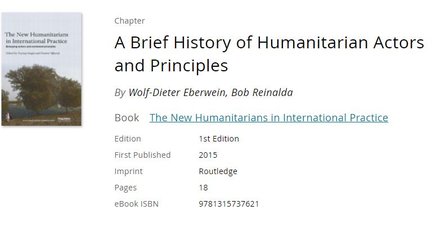
This chapter provides a brief history of humanitarian actors and principles, covering two complementary groups: humanitarian organisations in a wider and a more restrictive-sense with a recognised status in international humanitarian law. The normative institutionalisation of humanitarian action by non-governmental organisations (NGOs), governments and international governmental organisations (IGOs) associated with the UN has been a long process, which began with the first Geneva convention of 1864. The International Committee of the Red Cross (ICRC) continued its extension of international humanitarian law. The ICRC in turn expanded and systemised its actions in internal wars, among others during the Spanish civil war. The Steering Committee for Humanitarian Response (SCHR) includes the eight largest humanitarian NGOs and the ICRC, which given its legal status as guardian of international humanitarian law, is not an NGO. The core elements of the organisational institutionalisation are humanitarian policies of Western states which provide the necessary resources for emergency relief, non-governmental actors, instigated by medecins sans frontieres (MSF).